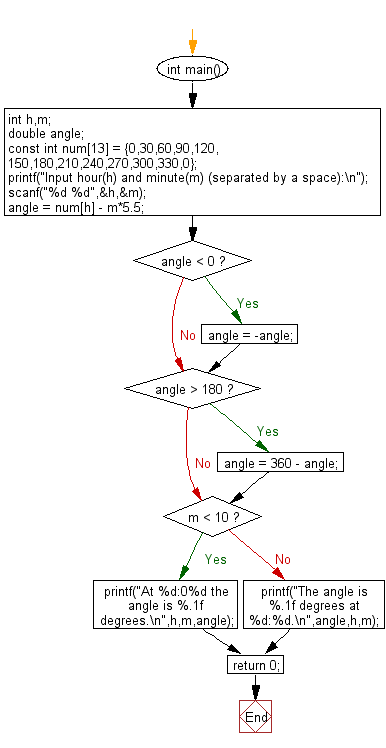C Exercises: Find the angle between (12:00 to 11:59) the hour hand and the minute hand of a clock
C Basic Declarations and Expressions: Exercise-91 with Solution
Write a C program to find the angle between (12:00 to 11:59) the hour hand and the minute hand of a clock.
The hour hand and the minute hand is always among 0 degree and 180 degree. For example, when it's 12 o'clock, the angle of the two hands is 0 while 3:00 is 90 degree and 6:00 is 180 degree.
Sample Solution:
C Code:
#include <stdio.h>
#include <math.h>
#include <stdlib.h>
int main()
{
int h,m;
double angle;
const int num[13] = {0,30,60,90,120,150,180,210,240,270,300,330,0};
printf("Input hour(h) and minute(m) (separated by a space):\n");
scanf("%d %d",&h,&m);
angle = num[h] - m*5.5;
if (angle < 0)
angle = -angle;
if (angle > 180)
angle = 360 - angle;
if ( m < 10 )
printf("At %d:0%d the angle is %.1f degrees.\n",h,m,angle);
else
printf("The angle is %.1f degrees at %d:%d.\n",angle,h,m);
return 0;
}
Sample Output:
Input hour(h) and minute(m) (separated by a space): The angle is -23076408.0 degrees at 0:4195776.
Flowchart:

C programming Code Editor:
Contribute your code and comments through Disqus.
Previous:Write a C program to find all prime palindromes in the range of two given numbers x and y.
Next: Write a C program to find the last non-zero digit of the factorial of a given positive integer.
What is the difficulty level of this exercise?
Test your Programming skills with w3resource's quiz.
C Programming: Tips of the Day
Static variable inside of a function in C
The scope of variable is where the variable name can be seen. Here, x is visible only inside function foo().
The lifetime of a variable is the period over which it exists. If x were defined without the keyword static, the lifetime would be from the entry into foo() to the return from foo(); so it would be re-initialized to 5 on every call.
The keyword static acts to extend the lifetime of a variable to the lifetime of the programme; e.g. initialization occurs once and once only and then the variable retains its value - whatever it has come to be - over all future calls to foo().
Ref : https://bit.ly/3fOq7XP
- New Content published on w3resource:
- HTML-CSS Practical: Exercises, Practice, Solution
- Java Regular Expression: Exercises, Practice, Solution
- Scala Programming Exercises, Practice, Solution
- Python Itertools exercises
- Python Numpy exercises
- Python GeoPy Package exercises
- Python Pandas exercises
- Python nltk exercises
- Python BeautifulSoup exercises
- Form Template
- Composer - PHP Package Manager
- PHPUnit - PHP Testing
- Laravel - PHP Framework
- Angular - JavaScript Framework
- Vue - JavaScript Framework
- Jest - JavaScript Testing Framework
